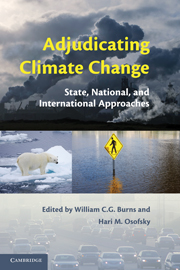Book contents
- Frontmatter
- Contents
- Foreword
- Acknowledgments
- Adjudicating Climate Change
- 1 Overview: The Exigencies That Drive Potential Causes of Action for Climate Change
- PART I SUBNATIONAL CASE STUDIES
- PART II NATIONAL CASE STUDIES
- 6 The Intersection of Scale, Science, and Law in Massachusetts v. EPA
- 7 Biodiversity, Global Warming, and the United States Endangered Species Act: The Role of Domestic Wildlife Law in Addressing Greenhouse Gas Emissions
- 8 An Emerging Human Right to Security from Climate Change: The Case Against Gas Flaring in Nigeria
- 9 Tort-Based Climate Litigation
- 10 Insurance and Climate Change Litigation
- PART III SUPRANATIONAL CASE STUDIES
- 17 Conclusion: Adjudicating Climate Change across Scales
- Index
- References
6 - The Intersection of Scale, Science, and Law in Massachusetts v. EPA
Published online by Cambridge University Press: 25 August 2009
- Frontmatter
- Contents
- Foreword
- Acknowledgments
- Adjudicating Climate Change
- 1 Overview: The Exigencies That Drive Potential Causes of Action for Climate Change
- PART I SUBNATIONAL CASE STUDIES
- PART II NATIONAL CASE STUDIES
- 6 The Intersection of Scale, Science, and Law in Massachusetts v. EPA
- 7 Biodiversity, Global Warming, and the United States Endangered Species Act: The Role of Domestic Wildlife Law in Addressing Greenhouse Gas Emissions
- 8 An Emerging Human Right to Security from Climate Change: The Case Against Gas Flaring in Nigeria
- 9 Tort-Based Climate Litigation
- 10 Insurance and Climate Change Litigation
- PART III SUPRANATIONAL CASE STUDIES
- 17 Conclusion: Adjudicating Climate Change across Scales
- Index
- References
Summary
INTRODUCTION
Justice Scalia: But I always thought an air pollutant was something different from a stratospheric pollutant, and your claim here is not that the pollution of what we normally call “air” is endangering health.…[Y]our assertion is that after the pollution leaves the air and goes up into the stratosphere it is contributing to global warming.
Mr. Milkey: Respectfully, Your Honor, it is not the stratosphere. It's the troposphere.
Justice Scalia: Troposphere, whatever. I told you before I'm not a scientist. (Laughter).
Justice Scalia: That's why I don't want to deal with global warming, to tell you the truth.
The above exchange occurred between Justice Scalia and James Milkey, Assistant Attorney General of Massachusetts, during the oral argument in Massachusetts v. EPA, the first case heard by the U.S. Supreme Court on governmental regulation of greenhouse gas emissions. It not only illustrates the complexities of judicial engagement with the science of global warming but also provides a window into one of the greatest obstacles to effective regulatory approaches to the problem of climate change, which the Obama administration must grapple with as it embarks upon its ambitious climate and energy initiatives. Namely, greenhouse gas emissions and their impacts are foundationally multiscalar; they range from the most individual to global levels.
Referencing climate change as a multiscalar problem, however, only serves as a starting point for further discussion. “Scale” is a complex and contested concept in both the geography and the ecology literatures.
- Type
- Chapter
- Information
- Adjudicating Climate ChangeState, National, and International Approaches, pp. 129 - 144Publisher: Cambridge University PressPrint publication year: 2009
References
- 2
- Cited by



